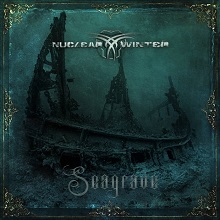By Georgia Smith

 Zimbabwean musician Gary Stautmeister offers an atmospheric deep-dive into musical storytelling and evocative creepiness on his latest album, ‘Seagrave’, as Nuclear Winter. Richly layered sounds of choral melodies twist and lilt alongside heavy, almost threatening harsh vocals and thick, thunderous guitars. ‘Seagrave’ – a simpler approach than earlier Nuclear Winter work with a fresh focus on the versatility of heavier sounds tells a tale of hopelessness, wandering, loss; and each of its eight tracks evoke these feelings uncannily, whether through the atmospheric choral undertones, the rising eeriness of their marriage to the heaviness, or the subtle narratives of the tracks returning to the sea-grave themes, Nuclear Winter’s latest album is a masterclass in melodic, freshly cinematic metal.
Zimbabwean musician Gary Stautmeister offers an atmospheric deep-dive into musical storytelling and evocative creepiness on his latest album, ‘Seagrave’, as Nuclear Winter. Richly layered sounds of choral melodies twist and lilt alongside heavy, almost threatening harsh vocals and thick, thunderous guitars. ‘Seagrave’ – a simpler approach than earlier Nuclear Winter work with a fresh focus on the versatility of heavier sounds tells a tale of hopelessness, wandering, loss; and each of its eight tracks evoke these feelings uncannily, whether through the atmospheric choral undertones, the rising eeriness of their marriage to the heaviness, or the subtle narratives of the tracks returning to the sea-grave themes, Nuclear Winter’s latest album is a masterclass in melodic, freshly cinematic metal.
Following on from the complexities of the earlier albums, ‘The World Below’ (2014) and ‘Inhale Kill Exhale’ (2019), Nuclear Winter returns with the same well-received heavy vocals of Stautmeister and thickness of instrumentals, the same eerie harshness and depth to the lyrics and production, but with a simpler spin; a more refined edge. ‘Seagrave’ questions the nature of hopelessness, loss, and disorientation- and in such a way that these heavy themes remain accessible and immediately understandable.
The album has an almost nautical theme, fittingly surrounding the meandering, creeping sound that Stautmeister is well on the path to perfecting. Fantasy-esque lyrics of ghosts and demons, being lost at sea and the desperation to find a better way on tracks like ‘The Dusk and The Song’ and the final track ‘Black Waters’ give the album a narrative style, almost a tale that Stautmeister tells through the fine-tuned amalgamation of a thunderingly thick musical backdrop, its elevating choral elements, and his own emotion-wrought vocals.
This choral element – think a cathedral-esque, echoing cacophony of keening voices – is used on every track of this newest release. ‘Seagrave’s opening track ‘The Glimmering Landscape’ makes this immediately apparent, relying on the inherent creepiness of these ghostly, echoing voices to embody the spirit of the gothic nature of its lyrics. ‘Starward Longing’ and ‘Pale Memories’ are most notable for their use of this choral sound, always atmospheric and strikingly cinematic in their composition.
The balance between Stautmeister’s tormented harsh vocals and the ethereal nature of these choral focuses enriches the album; it becomes a dense landscape of suffering and redemption, a constant balance and battle between the elements of struggle that ‘Seagrave’ explores. Repetitive echoing choral phases twist around thick riffs and vocal desperation, feeling almost fundamentally wrong in their differences and yet working so effectively to create the subversive, creepy, imposing atmosphere of Stautmeister’s vision that it seems they should have never been kept apart.
This ghostly, otherworldly feel is never more apparent than on ‘Fate’s Mysteries’, where the sound, rich in its bass and guitar, is cacophonous, multi-faceted, seeming to come from every direction and converge in Nuclear Winter’s core album concepts. Longer, technical guitar phases twist and meander atop empowered, awe-inspired choral vocals and harsh, desperate main ones descend into an almost spoken-word style, seeming curselike and spooky. Elements of Nuclear Winter’s latest release are reminiscent of Swedish rock band Ghost, albeit with heavier themes and vocals, as Stautmeister searches for the answers that the latest album asks with increasingly violent desperation.
Electronic elements play their role in this latest release, with ‘Pale Memories’ sounding the most electronically-charged in terms of guitar tone and style without sounding out of place in terms of the rest of the album. More melodic, somewhat lighter, these electronic sounding phases allow ‘Seagrave’ to explore a range of methods to express the core ideas. Repetitive electronic sounds in ‘Thy Shadows Fall’ are reminiscent of dripping water, in-fitting with the semi-nautical theme, and suggest a depth to the intentions of Nuclear Winter that will only become apparent with repeated listens. Deeply, thoroughly crafted tracks with this kind of attention to detail carry the heaviness and confusion of ‘Seagrave’ and its themes whilst making the album itself exist almost as a narrative, a personal journey through the struggles of life and yet simultaneously a fantastical, gothic exploration into the ocean, the unimaginable, and the unreal.
Final track ‘Black Waters’ is a self-confessed tale of a lover lost at sea, and has the rich clean sounds descending into meticulously engineered heaviness in a way that could fit nothing else. Thudding, nasty riffs thrum beneath winding melodies, and Stautmeister’s roaring vocal lament. Complexities of guitar phases subtly showcase a range of musical talent, whilst poetic lyrics elevate the cacophonous multi-vocal choral sound. To embody such a diverse, fresh style and carry it resolutely through an entire album is a silent success; the mixture of musical elements is never boring, kept fresh with the hints of electronica and melody. By creating such a diverse landscape, Nuclear Winter can be as free as it wishes to expel the torment that the vocals make so apparent.
This cinematic, atmospheric offering from Nuclear Winter seems more refined than previous releases, possibly due to the intentional focus on simplicity of production and strength of thematic emotions. Raising questions but providing no concrete answers, spreading a landscape of potentials in its musical and tonal differences, the album dredges emotions from the deepest recesses and brings them gasping to the surface. Cathartic, gripping, in places almost alarming in its density and vociferousness,
‘Seagrave’ is a thunderous experience, simultaneously an eerie, haunting one, but always slightly beyond the realm of the definable.
- ‘Seagrave‘ is out now.
- All content © Über Rock. Not to be reproduced in part or in whole without the express written permission of Über Rock.
